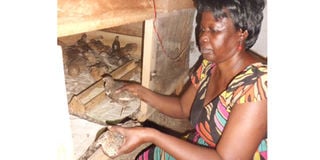Farmer finds gold mine in quail eggs

Joyce Obitiru wears a smile as she collects her eggs. PHOTOS LOMINDA AFEDRARU.
What you need to know:
- It is widely believed that eggs of quails, which are naturally high in ovomucoid protein and both vitamins A and C, help in neutralising killer diseases such as cancer, hypertension, arthritis and diabetes among others, writes LOMINDA AFEDRARU.
Quail farming is not so common in Uganda like the rearing of other poultry birds such as chicken, turkey and ducks.
But a number of farmers mainly in Kampala city surroundings are now venturing into quail farming because of its high income.
One such a farmer is Joyce Obitiru Amandrua, a resident of Mbuya Kinawataka, a Kampala suburb, who is rearing the birds alongside her salon business.
Background
Obitiru used to hear people talk about Kenyan farmers rearing the birds and that the business was booming.
Inspired by a captivating success story aired on a local TV station two years ago, Obitiru decided it was high time she ventured into the enterprise.
The story emphasised the nutritional benefits of the quail meat and its eggs.
While farmers pocket in millions profits from egg sales, it is widely believed the eggs, which are naturally high in ovomucoid protein and both vitamins A and C, reportedly help in neutralising killer diseases such as cancer, hypertension, arthritis and diabetes among others.
“I got excited and I decided to seek information as to where I could get stock of the birds. My major target was to ensure my family members consume the eggs which contain vitamin, iron, zinc, iodine, salt, protein and many more for prevention of chronic sicknesses. I was further aiming at establishing a lucrative business embarking on sale of the eggs,” she says.
Starting
It was not until March 2017 when Obitiru consulted a leading breeder of the quail birds in Seeta, Mukono that her dream of rearing the birds took off.
She purchased 200 young birds each at Shs5, 000, though a mature one is sold between Shs15, 000 and Shs20, 000.
She narrates that it is less costly to rear the birds because they are small and can be kept in a demarcated cage.
She is keeping the birds in a single phased cage in the family house garage.
The birds matured within six to seven weeks and the female ones started laying eggs thereafter on daily basis.
At the moment, she has 160 birds because others died during the course of growing and some flew away.
She collects a maximum of 80 eggs per day which she packages in trays each comprising 18 eggs.
Some farmers package the eggs in trays comprising six eggs, others in trays containing 12 and 30 eggs.
Obitiru sells a tray of 18 eggs between Shs10, 000 and Shs18, 000 depending on the marketing strategy and most of her customers are within the surrounding suburbs. She gets 35 trays in a week.
She says she used to concentrate on her salon business at Kinawataka Trading Centre where competition was so high, but she has since relocated to her house because she has to take care of the birds at the same time.
Selling the eggs is making her get additional income to care for family needs.
It is a good practice to keep both male and female birds together in the same cage.
However, Obitiru says it is not economical for her to go into hatchery business since a female quail lays two eggs at a time therefore confining it to hatch only two eggs is not a viable business.
Challenges
At the moment, Obitiru is faced with the challenge of marketing eggs, but her daughter Cynthia Dranimva, a student at Makerere Business School (MUBS), is helping in marketing.
“When I’m at home, I help in feeding and collecting the eggs which I pack in trays. I have opened a Facebook group called Joy Quails which I use to advertise the product and I’m attracting a number of followers. Most of them get excited about the health benefits but my target is to draw their attention into purchasing the eggs,” Dranimva notes.
Sales
Obitiru sells a tray comprising 18 eggs between Shs10, 000 and Shs18, 000 depending on the marketing strategy.
Most of her customers are within her village.




